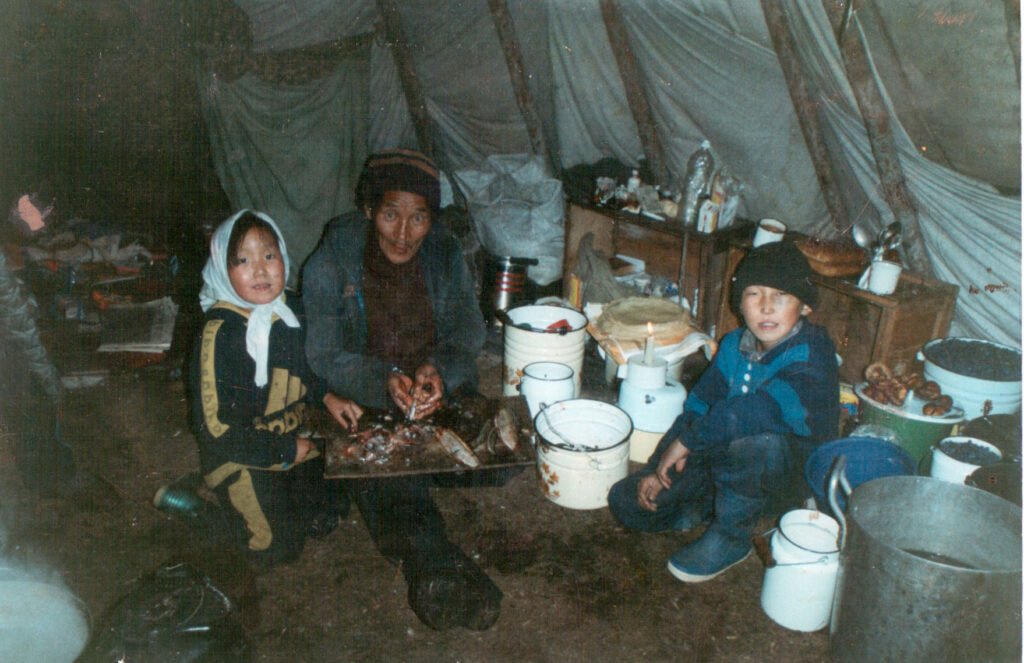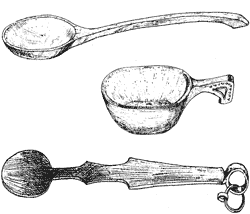The Evenks (Tungus) are one of the indigenous minorities inhabiting the vast expanses of Eastern Siberia of the Russian Federation, as well as the northern territories of China and Mongolia. The Evenk language belongs to the northern subgroup of the Tungus-Manchu group of languages. The wide settlement of the Evenks determines the division of the language into dialect groups: northern, southern and eastern. The closest affinity of the Evenk language (as well as culture in general) is observed with the Evens and Negidals. The ethnonym “Evenki”, despite the existence of different versions, most likely comes from the Evenk word “evunki” (the Evenks of China sound: [ewunki; ewenki]) - across, transverse [Myreeva, p. 753]. V.A. Tugolukov associated this term with the mountain-taiga nomadic way of life, figuratively calling the Evenks "walking across the ridges." In folklore, the self-name of the Evenks is denoted as "Eunki ehachi" - cross-eyed. In our opinion, it was this folklore epithet "two-legged, black-headed, and cross-eyed Evenk man" that served as the basis for the self-designation of the people back in the distant historical time, when the ancestors of modern Evenks began to consider themselves as one nation.
In Russia, Evenks are settled over a vast territory from the left bank of the Yenisei in the West to the Sea of Okhotsk in the East and from Transbaikalia and Priamurye to the polar regions of Western and Eastern Siberia. Evenks live within the republics of Yakutia and Buryatia, Irkutsk, Chita, Amur, Sakhalin and Tomsk regions, Krasnoyarsk and Khabarovsk territories. The number of Evenks according to the results of the 2010 all-Russian census is more than 38 thousand people. The largest number of Evenks live in Yakutia, Krasnoyarsk and Khabarovsk territories. According to historical documents of the XVII-XIX centuries. the largest number of Evenks in Russia is recorded about 65 thousand people. (census 1897).
In order to present a complete and figurative idea of the Evenks as an ethnos, it is best to turn to the statements of famous researchers of Siberia: "In courage, humanity and meaning, the Tungus surpass all nomads who live in yurts," wrote the 18th century Russian sailor Lieutenant Khariton Laptev. “They have a well-known bearing, are full of decency, dexterity, adventurous to the point of courage, lively, frank, proud, willing to dress up, and at the same time are physically hardened,” the famous 19th century traveler, academician A.F. Middendorf.
“Loyal and servile to the point of servility, the Tungus know how to maintain their own dignity and be proud without arrogance. They despise lies and can serve as a model of honesty ”, - the words of the famous researcher-northern studies expert V.I. Jochelson.
“Тунгусы отличаются смелостью, не терпят пустой болтовни и считают ее величайшим позором”, – участник II Камчатской экспедиции Российской Академии наук Яков Линденау. “Тунгусы – изящный и щеголеватый народ. Их по справедливости можно было бы назвать аристократами Сибири…”, – известный этнограф М.А. Кастрен. Ссыльный декабрист В. Кюхельбекер также называл тунгусов “сибирскими аристократами”, а первый енисейский губернатор А. Степанов писал, что “их костюмы напоминают камзолы испанских грандов…”. «Раз тронувшись в путь, тунгусы обыкновенно не скоро останавливались, и часто движение, начатое в известном направлении отдельными лицами или семьями, продолжается целые годы и десятки лет, охватывая все большую и большую часть тунгусов известной местности», – отмечал русский этнограф С. Патканов.
The great explorer of the North, Fridtjof Nansen, when he first encountered the Evenks, was amazed at their courage, courage, endurance, and amazing knowledge of the surrounding nature. He compared them with the Indians of North America and regretted that there was no Siberian Fenimore Cooper who could glorify the Evenks in the same way that Cooper glorified the Iroquois or Delawares.
Thousands of years of experience of close coexistence of the Evenks with nature, has developed not only the originality of the Evenk mentality, which attracted the attention of other people, but also the very, truly ecological, “man-nature” model. As the well-known biologist Yu.G. Rychkov for more than seven thousand years of history of the Tunguses, not a single biological species of fauna or flora has disappeared on the vast territory of their settlement [Rychkov 1995]. The problem of the history of the Evenks has been debated in the scientific community for a long time. Existing hypotheses suggest different eras and localization of the formation of the Tungus-Manchu peoples. Among the most popular hypotheses, theories about the northern and southern origin of the Tungus is noted. One of the founders of the theory of southern origin is S.M. Shirokogorov, indicating the localization of the source of the formation of prototungus between the Yangtze and the Yellow River in the post-Neolithic era [Shirokogorov 1929]. V.A. Tugolukov believed that the ancestors of the Tungus were the Trans-Baikal people of the Uvan, information about which dates to the beginning of the 1st millennium AD. [Tugolukov 1971]. Recently, the hypothesis of G.M. Vasilevich about the Baikal ancestral home of the Prototungus, from where, in her opinion, the ancestors of modern Evenks, Evens and other Tungus-Manchus began settling in the vastness of the Siberian taiga, starting from the Neolithic era. The validity of this hypothesis is confirmed by archaeological, genetic, linguistic scientific information, and is also reflected in the folklore of the Evenks and other related ethnic groups. The history of the Tungus is also recorded in historical documents from different eras. The earliest mentions of the Tungus are found in the ancient Chinese chronicles: “The Southern Tungus, according to the assurance of ancient Chinese history, more than 2200 years BC. have already gone by waterway to the capital of China to present local works to the head of the Empire ”[Bichurin 1951, pp. 7-8].
The originally hunting nomadic economic type of the Evenks in the process of historical development has undergone certain changes, which include the acquisition of horse breeding and reindeer breeding. At the same time, for most Evenk groups, hunting remains the fundamental economic model of management and the basis thanks to which the ethnos manages to preserve its original nomadic culture. That is why the reindeer husbandry acquired in due time among the Evenks has acquired peculiar unique features - a transport type, the hallmark of which is horse riding and the maximum degree of tameness of the livestock. The oldest hunting rituals, which originated in time immemorial, are tenacious among the Evenks to this day. The mystical rite of obtaining hunting luck Singkalevun or the Nimat custom, which allowed nomadic hunting communities to survive in harsh natural conditions for centuries and millennia, are integral parts of the ancient hunting culture.
Almost half of all Evenki in the Russian Federation live in the Republic of Sakha (Yakutia), where, according to the 2010 census, about 22 thousand representatives of the people were registered. Here they are approximately equally concentrated in the Aldansky, Anabarsky, Bulunsky, Zhigansky, Oleneksky, Olekminsky, Neryungrinsky and Ust-Maisky uluses, as well as in large cities of the republic. A significant part of the Evenks of Yakutia has traditional types of farming - hunting and reindeer herding, due to which most of the cultural elements of the ethnos continue to be preserved. The greatest threat is caused by a decrease in the degree of preservation and distribution of the Evenk language. Today, no more than 15% of Evenki speak their native language in Yakutia.
At the same time, it should be noted the high social and social activity of the Evenks living in Yakutia, due to which many cultural elements and traditions are preserved, revived and receive new development. Since the 90s. XX century everywhere where Evenks live, the Bakaldyn (Ikenivke) holiday is held, creative teams and talented performers of ethnic music appear, and the ethnic self-awareness of the younger generation is growing. All this allows us to hope for a prosperous future for the nomads of the taiga and for the ability of the ancient ethnos to adapt in the context of globalization.
A.N. Varlamov
- About 40 thousand Evenks live in China and Mongolia. Horse breeding is the main economic type of Evenks in China and Mongolia.
- G.M. Vasilevich noted that until 1931 Evenks, Evens, and Negidal were called tungus (Evenki, 1969: 3).
- V.A. Tugolukov linked the ethnonym “Evenki” with the name of the people “Uvan”.


